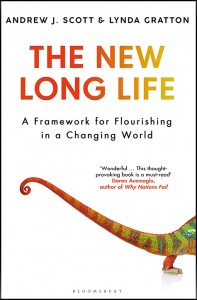Long Life & Flourishing in a Changing World


Smart new technologies. Longer, healthier lives. Human progress has risen to great heights, but at the s ame time it has prompted anxiety about where we’re heading. Are our jobs under threat? If we live to 100, will we ever really stop working? And how will this change the way we love, manage and learn from others?
ame time it has prompted anxiety about where we’re heading. Are our jobs under threat? If we live to 100, will we ever really stop working? And how will this change the way we love, manage and learn from others?
One thing is clear: advances in technology have not been matched by the necessary innovation to our social structures. In our era of unprecedented change, we haven’t yet discovered new ways of living.
Drawing from the fields of economics and psychology, authors Andrew J. Scott and Lynda Gratton offer a simple framework based on three fundamental principles (Narrate, Explore and Relate) to give you the tools to navigate the challenges ahead. Both a personal roadmap and a primer for governments, corporations and colleges, The New Long Life: A Framework for Flourishing in a Changing World, is the essential guide to a longer, smarter, happier life.
This is a story of human ingenuity relentlessly increasing life expectancy and continually developing powerful new technologies. As a consequence of these developments, your life will be longer and the stages within it shorter and more varied.
How you work and what you do, when you learn, love and play and how you view yourself and your future will all change dramatically. These changes will create extraordinary possibilities. But to make the most of them, you need now to re-imagine your life in ways that are fundamentally different from your parents or grandparents.
Gratton and Scott explain how the careers of the future won’t simply involve ascending a corporate ladder with experience and seniority, or perhaps shifting to a different company within an established industry. Instead, workers will likely find themselves alternating periods of employment with time out of the workforce, with some of that hiatus used to acquire skills that will enable them to cope with evolving technologies.
The book is separated into three distinct parts:
- Human Questions- Will machines take our jobs? How can we stay fit, healthy, active and engaged for longer? How can everyone remain economically productive and work for longer? The questions we have raised do not relate to a science-fiction world. They are about the world we live in today, and the world we and our children will live in over the coming decades.
- Human Ingenuity—Navigating your life story. One of our foundational touchstones for human flourishing is our capacity to create narrative that provides meaning to our life.
- Human Society—The practices, norms and culture established by corporations will have a major role to play in determining whether humans are able to flourish. A cornerstone of a fulfilling life is deep relationships within a family and within the wider community. How can the corporate agenda respond to longevity and technology in a way that makes it easier to combine work and family in a fulfilling way?
What advice do they have for readers? Here are a few takeaways:
- Human skills that we need to continue to develop include critical thinking, hypothesis framing and synthesis. This will help distinguish and prolong human competencies that won’t be replaced by a machine.
- A cornerstone of human flourishing is the capacity to explore, to learn and to transform.
- Act pre-emptively. We are living through a period of profound change that will impact everyone. An ever-greater degree of responsibility for managing that change is being handed over to you, meaning that you must take action now.
- Orientate yourself to the future. Whatever your age, you have a longer time horizon ahead of you than past generations. This puts a premium on being forward-looking and thinking carefully about investments that can compound over time.
- Be aware of your possible selves. A longer life and more transitions open up a wider set of possible selves. Making the most of this will require exploring these possibilities and keeping your options open for longer.
- Focus on malleability and recursivity. Both your age and how your time is structured and distributed have become more malleable. That means your actions now can influence how you age and your future options and choices.
- Accept transitions. Whether under your instigation or forced upon you, substantive life changes can be difficult. Looking forward, these transitions will inevitably be more frequent and will form knots that tie the threads of a multistage life together.
All of us are having to redesign life and our society, and we need to ensure that generations can come together to sculpt a more human future.

